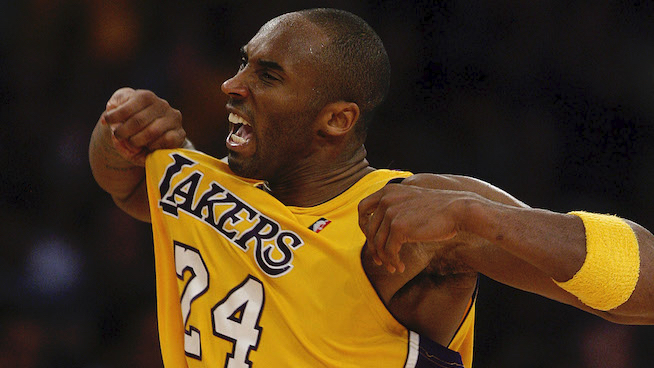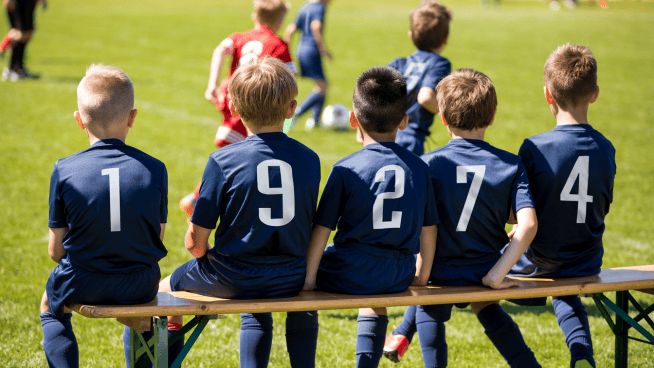Mindset Predicts Success as an Athlete
There are four components necessary to become a complete athlete: movement, nutrition, recovery and mental state. Coaches spend years working on movement, athletes personally invest in nutrition, and trainers focus on recovery. Mental performance is often overlooked. So who’s in charge of interconnecting the components by going inside the athlete’s mind? (See Test Your Mental Toughness With the Sports Performance Assessment App.)
Athletes’ Performance works with athletes on linking the four pillars together, because to achieve success, an athlete is only as strong as his or her weakest link. According to Trevor Moawad, AP’s Vice President of Mindset Programs, every coach is looking for consistency; and the mindset piece helps connect the dots of all the other elements of elite performance. Moawad says, “The most common misunderstanding in sports psychology is that it’s 80 to 90 percent mental. [Being mentally tough] comes from having [good] habits and… putting in a plan to do [them] daily.”
This is not about radically changing the way you approach your daily life, but upgrading your game plan to be successful on the field and off. Successful athletes know how to prepare from the minute they wake up to the time they go to bed. It’s about doing the small things savagely well—like adequate hydration, fueling, sleep and recovery habits—as well as training and on-field performance.
Moawad relates his work as similar to a net. You throw a broad net of athletic development over these athletes. Some will get hooked, others will connect best with a trainer, and still others will connect better with a psychology consultant. The one thing in common is the skill of the practitioner.
“Regarding mindset, everything you communicate is common sense,” Moawad says. “There’s nothing I can tell an athlete that they haven’t heard before, but it’s how I do it that matters. My broader skill, what allows me to be successful, is to communicate. [It’s] the way you stay connected to the athletes. You have to be your authentic self. That athlete can tell authenticity.”
Working on an athlete’s mental state is valuable to some, but shunned by others. Not many schools have a “mental” budget, so this kind of education doesn’t always pass muster in the athletic department. But now more than ever, schools and professional teams are allocating resources on recruiting services, yoga instructors, nutritionists and mental coaches. All of these services contribute to the success of an elite athlete. But to be that elite athlete, you have to understand your value off the field and always be thinking about how to improve your place in the world. The same can be said of a sports psychologist.
Want to develop your own strong mindset? Check out these STACK articles:
RECOMMENDED FOR YOU
Mindset Predicts Success as an Athlete
There are four components necessary to become a complete athlete: movement, nutrition, recovery and mental state. Coaches spend years working on movement, athletes personally invest in nutrition, and trainers focus on recovery. Mental performance is often overlooked. So who’s in charge of interconnecting the components by going inside the athlete’s mind? (See Test Your Mental Toughness With the Sports Performance Assessment App.)
Athletes’ Performance works with athletes on linking the four pillars together, because to achieve success, an athlete is only as strong as his or her weakest link. According to Trevor Moawad, AP’s Vice President of Mindset Programs, every coach is looking for consistency; and the mindset piece helps connect the dots of all the other elements of elite performance. Moawad says, “The most common misunderstanding in sports psychology is that it’s 80 to 90 percent mental. [Being mentally tough] comes from having [good] habits and… putting in a plan to do [them] daily.”
This is not about radically changing the way you approach your daily life, but upgrading your game plan to be successful on the field and off. Successful athletes know how to prepare from the minute they wake up to the time they go to bed. It’s about doing the small things savagely well—like adequate hydration, fueling, sleep and recovery habits—as well as training and on-field performance.
Moawad relates his work as similar to a net. You throw a broad net of athletic development over these athletes. Some will get hooked, others will connect best with a trainer, and still others will connect better with a psychology consultant. The one thing in common is the skill of the practitioner.
“Regarding mindset, everything you communicate is common sense,” Moawad says. “There’s nothing I can tell an athlete that they haven’t heard before, but it’s how I do it that matters. My broader skill, what allows me to be successful, is to communicate. [It’s] the way you stay connected to the athletes. You have to be your authentic self. That athlete can tell authenticity.”
Working on an athlete’s mental state is valuable to some, but shunned by others. Not many schools have a “mental” budget, so this kind of education doesn’t always pass muster in the athletic department. But now more than ever, schools and professional teams are allocating resources on recruiting services, yoga instructors, nutritionists and mental coaches. All of these services contribute to the success of an elite athlete. But to be that elite athlete, you have to understand your value off the field and always be thinking about how to improve your place in the world. The same can be said of a sports psychologist.
Want to develop your own strong mindset? Check out these STACK articles:











